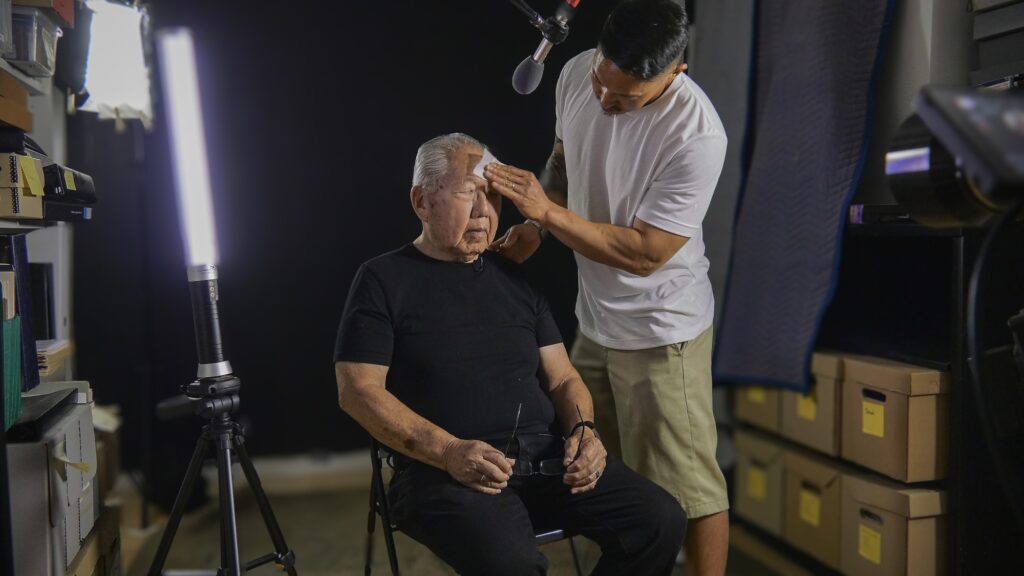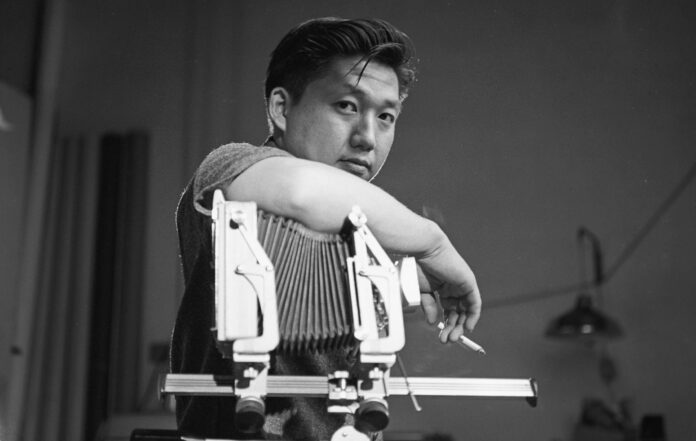At its heart, Third Act is a story of love, loss, resilience, and the power of storytelling.
Directed by Tadashi Nakamura, the deeply personal documentary (opening the CAAMFest Asian American film festival on Thu/8) chronicles the life of the filmmaker’s father, Robert A. “Bob” Nakamura—widely known as the “Godfather of Asian American Media”—through three pivotal acts. It is a multi-generational meditation on family, historical trauma, and the enduring need to preserve memory, even as time and illness threaten its erasure.
Tadashi Nakamura, a celebrated documentarian in his own right (Mele Murals, Jake Shimabukuro: Life on Four Strings), has long known he would eventually make a film about his father. But it wasn’t until Robert got on in years that Tadashi realized the urgency of capturing his story.
“Once I noticed he was slowing down and realized he’s not getting any younger,” says Tadashi, “I felt like it was now or never.”
What began as a plan in 2017 to document Robert’s professional legacy, over seven years of shooting, evolved into a raw and moving exploration of their father-son relationship, unearthing hidden wounds, generational sacrifices, and ultimately, the profound ways love endures.
Born in 1936, Robert A. Nakamura lived through one of the darkest chapters in American history—the mass incarceration of Japanese Americans during World War II.
As a child imprisoned at Manzanar, Robert struggled with deep feelings of shame and internalized racism, wishing he could be anyone but Japanese American.
Later, he found early success as a photographer, but soon abandoned a lucrative career to use filmmaking as a tool for social change.
His groundbreaking 1971 short documentary, Manzanar, and 1980’s Hito Hata: Raise the Banner were some of the first films to authentically tell Asian American stories from within the community itself.
Robert didn’t just make films; he built institutions—Visual Communications, the Watase Media Arts Center at the Japanese American National Museum, and the Center for EthnoCommunications at UCLA—to ensure generations after him could do the same.
Yet, in Third Act, Tadashi doesn’t just present Robert as an icon. He portrays him as a father, a flawed but striving human being, grappling with the long shadows cast by historical trauma, aging, and illness. (Robert was diagnosed with Parkinson’s disease during filming.)
“And then, I was grateful that we had started because the decline of his health started ramping up quickly,” Tadashi says.

As Robert’s health declined, his vulnerability increased, allowing Tadashi access to emotional depths he hadn’t expected. “If it wasn’t for his Parkinson’s and his facing his mortality,” says Tadashi, “he probably wouldn’t have been as open and honest.”
Indeed, one of the most powerful elements of Third Act is how it captures the rarely spoken emotions passed down through generations—the deep-seated shame, the complex ambivalence toward Manzanar, and the depression that followed Robert throughout his life.
In one particularly heartbreaking scene, Robert breaks down, revealing the internalized racism that continued to haunt him decades after camp life had ended. It is here that the documentary transcends biography, offering a searing portrait of the hidden costs of survival.
Throughout the film, Tadashi masterfully balances personal tenderness with historical context. Rather than presenting a CV of his father’s achievements, Tadashi anchors the story in their evolving relationship.
“Once we realized the film was about me and him—and not just his career—it became a very different film,” Tadashi says. “I tried to establish some of his achievements, but the heart of it was always about us.”
This focus allows Third Act to resonate beyond the immediate Nakamura family, offering a mirror to many viewers grappling with aging parents, intergenerational trauma, and the bittersweet task of raising children while caring for elders.
Importantly, Tadashi does not allow Third Act to sink into despair. Following his father’s wishes that the film not be a “downer,” Tadashi carefully weaves moments of humor, joy, and resilience throughout.
His young son brings bursts of levity and hope to the film, representing the future generations for whom the Nakamura story—and the broader Japanese American experience—must be preserved.
The film also adds fresh nuance to the ongoing conversation about Asian American identity. Rather than presenting a simplistic arc of victimization and triumph, Tadashi explores the gray areas: how childhood trauma can coexist with fond memories, how community healing is necessary for individual healing, and how racism, like Parkinson’s, may not have a “cure” but can be confronted and tackled.
“I’m really happy bringing these nuanced emotions to it, where I feel a lot of previous films are very black and white,” he says. “This was good. This was bad. We were victims. We pulled ourselves up by our bootstraps and overcame it. But this one doesn’t necessarily have a happy ending as much as a real and emotionally raw ending, which is more how people experience life.”
This authenticity is part of what makes Third Act feel so vital and immediate. In the context of rising anti-Asian racism, ongoing debates over memory and identity, and a country still struggling to reckon with its past, the documentary feels both timely and timeless.
For young Asian American creatives, Tadashi hopes the film offers inspiration and affirmation. “Asian Americans have always been community artists dedicated to telling our stories and creating social change,” says the filmmaker. “We don’t have to reinvent the wheel. We can draw strength from this legacy that we have, that we can choose to carry on.”
At its most moving, Third Act is about the conversations that are too often left unsaid—the apologies, confessions, and admissions that pass between fathers and sons—when it’s almost too late.
Tadashi admitted that, without the structure of filmmaking, he and Robert likely wouldn’t have had these conversations. But the camera became a kind of buffer, a bridge allowing them to speak honestly to one another in a way they couldn’t have otherwise.
“Both of us were very typical Asian men who weren’t very good at articulating our own emotions, especially to each other,” he says. “But because we had that third element—the film itself—it enabled these moments to be open and have these conversations.”
Ultimately, Third Act is a love letter: to a father, a community, and the healing power of art. It is also a challenge to remember, reckon, and honor the complexities of those who came before without turning away from the pain they carried.
As Robert Nakamura faces the final chapters of his life, Tadashi ensures that his father’s story, and by extension the story of countless others, will endure.
It’s also an important reminder that history is not just something that happens in books or museums. It is alive in the memories of elders, in the struggles they carry, and in the legacies they leave behind.
Third Act invites audiences to bear witness and reminds them that, in doing so, they help shape the next chapter.
CAAMFEST OPENING NIGHT: THIRD ACT May 8. AMC Kabuki 1, SF. Tickets and more info here.





